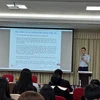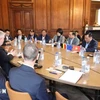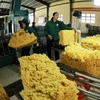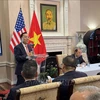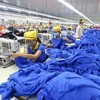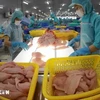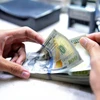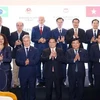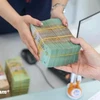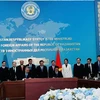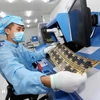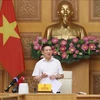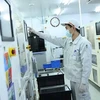Together with the signing of the Partnership and Cooperation Agreement, concluding negotiations on a free trade agreement (EVFTA) will mark significant progress in bilateral ties between Vietnam and the European Union (EU), stated a European Commission (EC) official.
Joseph Waldstein Wartenberg, Press Officer for Trade at the EC, said Vietnam is a trustworthy friend and partner of the EU, adding that the union attaches importance to developing a partnership with Vietnam, especially in economics and trade.
The two sides are scheduled to continue free trade agreement discussions on March 24, which is believed to be the final round to settle any remaining differences before the signing of the agreement.
The EVFTA is expected to fuel growth and job generation in both Vietnam and the EU, Wartenberg held.
He noted that EU is the second largest trade partner of Vietnam with 2013 trade hitting 27 billion EUR, including 21 billion EUR of EU’s imports from the Southeast Asian country. Vietnam is the fourth largest trade partner of the EU among ASEAN countries, and the 30 th among the union’s global trade partners.
Vietnam’s exports to the EU grew 28 percent from 2009 to 2013, he added. Major Vietnamese products shipped to the EU include footwear, apparel, coffee, rice, seafood and wooden products.
Commenting on the Vietnamese economy, Wartenberg said the country is one of the most rapidly developing ASEAN countries and serves as an outstanding example of an open trade market.
With its young and skilled workforce, the country has great potential for a trade and investment partnership with the EU, he said.
The official asserted that the EVFTA is an ambitious and comprehensive deal in terms of goods, services, investment and government purchase. Apart from the removal of tariff and non-tariff barriers, both sides are working to settle other issues related to trade, legal matters, competition, intellectual property, and geographical indication, he revealed.
At the same time, the deal is expected to create abundant business opportunities for both sides, said Wartenberg.
In order for Vietnam to avoid becoming a low-skill labour market, the EVFTA will include a chapter on sustainable trade and development, including commitments to uphold International Labour Organisation standards and regulations against sacrificing labour and environmental laws for the sake of trade and investment, he revealed.
He also expressed his appreciation of Vietnam’s commitment to economic and political reform, affirming that the EU will continue assisting Vietnam in the process through the EVFTA.-VNA
Joseph Waldstein Wartenberg, Press Officer for Trade at the EC, said Vietnam is a trustworthy friend and partner of the EU, adding that the union attaches importance to developing a partnership with Vietnam, especially in economics and trade.
The two sides are scheduled to continue free trade agreement discussions on March 24, which is believed to be the final round to settle any remaining differences before the signing of the agreement.
The EVFTA is expected to fuel growth and job generation in both Vietnam and the EU, Wartenberg held.
He noted that EU is the second largest trade partner of Vietnam with 2013 trade hitting 27 billion EUR, including 21 billion EUR of EU’s imports from the Southeast Asian country. Vietnam is the fourth largest trade partner of the EU among ASEAN countries, and the 30 th among the union’s global trade partners.
Vietnam’s exports to the EU grew 28 percent from 2009 to 2013, he added. Major Vietnamese products shipped to the EU include footwear, apparel, coffee, rice, seafood and wooden products.
Commenting on the Vietnamese economy, Wartenberg said the country is one of the most rapidly developing ASEAN countries and serves as an outstanding example of an open trade market.
With its young and skilled workforce, the country has great potential for a trade and investment partnership with the EU, he said.
The official asserted that the EVFTA is an ambitious and comprehensive deal in terms of goods, services, investment and government purchase. Apart from the removal of tariff and non-tariff barriers, both sides are working to settle other issues related to trade, legal matters, competition, intellectual property, and geographical indication, he revealed.
At the same time, the deal is expected to create abundant business opportunities for both sides, said Wartenberg.
In order for Vietnam to avoid becoming a low-skill labour market, the EVFTA will include a chapter on sustainable trade and development, including commitments to uphold International Labour Organisation standards and regulations against sacrificing labour and environmental laws for the sake of trade and investment, he revealed.
He also expressed his appreciation of Vietnam’s commitment to economic and political reform, affirming that the EU will continue assisting Vietnam in the process through the EVFTA.-VNA

